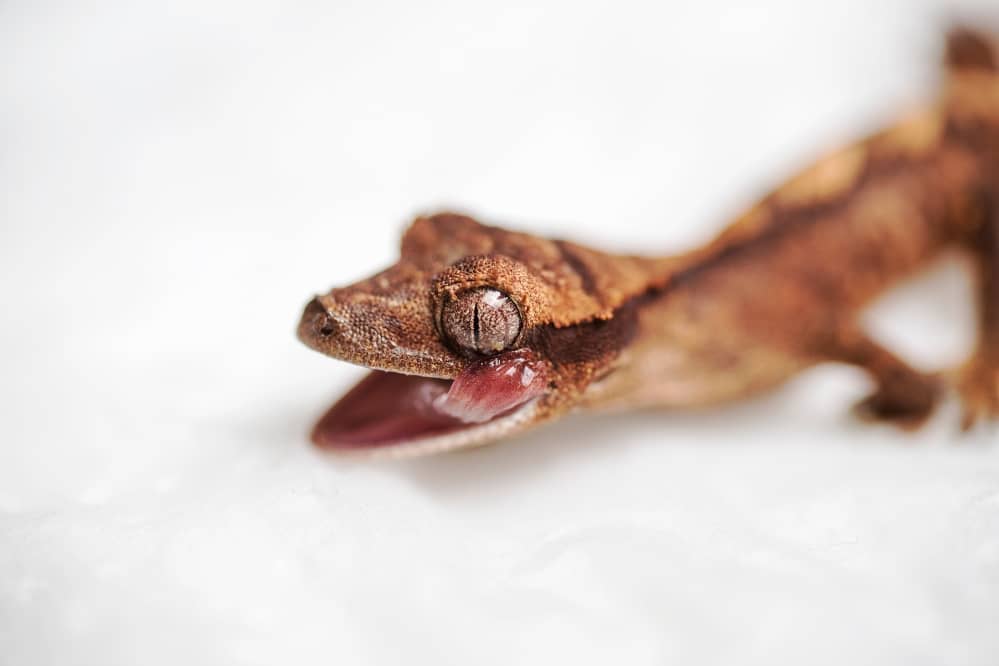A Crested gecko is usually a good choice for beginners, novice reptile fanciers, and families with kids. This is so because crested geckos are easy to keep and renowned for low-maintenance, calm, friendly, and docile disposition. In fact, crested geckos are the least aggressive member of the reptile community, who, even if stressed, upset, or afraid, prefer to escape or hide over combating or biting. Though male crested geckos are a bit territorial and may show aggression sometimes in the presence of other male crested geckos, they rarely become aggressive to humans.
However, things do not always proceed how we think, and crested geckos may become aggressive under certain circumstances (though it is less likely to happen).
Reasons, Why Crested Geckos Might Become Aggressive
Let’s discuss the reason for aggressiveness in crested geckos. Then in the latter half of the article, you will also learn can crested geckos bite or does their bite hurt etc.
New At Home (Unfamiliar People & Surroundings)
Not only crested geckos, every animal usually become a bit aggressive initially when he comes to his new home. Generally, this is so because when the pet finds himself in entirely unfamiliar surroundings and new people around him, they become nervous or upset. Newly adopted crested geckos may also become a bit aggressive initially due to the same reason.
So give your crested reptile at least 10-15 days to acclimate to a new home and people, and during this period, approach your crested gecko only when necessary.
Feels Too Exposed In The Vivarium
Crested geckos are nocturnal by nature, so they spend most of their time hiding and sleeping during the day, and they are active and come out to perform routine tasks at night. If you haven’t sufficiently covered the terrarium with plants (natural or artificial), caves, hides etc., and left lot of empty space, the crested gecko may feel too exposed or insecure in such place. So while preparing the terrarium for your crested friend, make sure to cover at least 60-65 % of the area with tree branches, small plants, leaves and other accessories.
Bad Memories
If your recently adopted crested gecko was mistreated or mishandled in the past, the bad memories could also make him stressed, timid and aggressive. Generally, crested geckos adopted from pet stores or adoption centers often have faced situations like insufficient food, poor quality diet, mishandling, improper habitat conditions etc. Such cresties may take a bit more time than others (who don’t have any bad memories), so be patient and take good care of your new friend before starting to handle it.
Territorial Instinct (Other Lizard Or Pets Around)
Though crested geckos are very docile and friendly with humans, they (especially males) are solitary and territorial by nature. So if another crested gecko (or even other lizards) is nearby, your crestie may feel threatened and become aggressive. In addition, crested geckos have a keen sense of smell, so if you are separately maintaining another crested gecko, they can smell it from your hands (especially if you handled the other crestie before approaching) and can become aggressive. Furthermore, other pets at home can also be a reason for crested gecko’s aggression if they have free access to your crestie’s tank and pass by it often.
Insufficient Or Inappropriate Diet
Naturally, thirst or hunger due to poor quality or insufficient amount of diet or water can make anyone angry or aggressive, and crested geckos are no exception. In addition to providing a good quality diet, you must also satisfy their instinct to hunt. Feeding live bugs is the best strategy to accomplish this goal. So you must feed your crested gecko live bugs at least twice weekly to satisfy their instinct to hunt. If you are a first-time reptile owner, make sure to discuss the feeding requirements of your crested gecko with your vet in detail.
Wrong Setup Inside The Tank
If the size of the tank is too small or too large, temperature and humidity levels are not within the recommended range, and temperature gradient is not correctly maintained, your crested gecko will become disturbed and can show aggressive behavior when you approach him. So before adopting a crested gecko, make sure that you have sufficient knowledge about the habitat requirement of these crested reptiles.
Its Mating Time
Generally, all animals become a bit aggressive when their breeding season arrives due to some hormonal changes. Crested geckos usually breed between March and November, so if your crested gecko reaches its age of puberty (that is, 12-18 months), you can expect a little bit of aggressiveness from him. Since the growth rate varies significantly among individual crested geckos, some slow-growing cresties may not show breeding behavior until they are 24 months of age. In addition to age, a crested gecko must weigh 15-20 grams to express breeding behavior.
In such situation, it’s better not to intervene and wait for him to settle down on his own; because mostly this hormonal changes doesn’t continue for more than a week (though it may take a few more days in some cresties).
Your Crested Reptile Is Shedding
Like all other reptiles, crested geckos also go through a process of replacing their old skin with the new one, process called Shedding. Seasoned reptile owners know that Shedding is a bit painful, stressful and disturbing process, and during shedding, reptiles become a bit moody and don’t want to be handled. The same is the case with crested geckos; they become off-feed and show aggressive behavior if you try to handle them.
Like hormonal changes during the mating season, Shedding is also a natural process, so don’t disturb your crested friend during this phase and let the process complete naturally.
Related article How Often Do Crested Geckos Shed?
Your Crested Gecko Is Sick
In the end, if everything else (like temperature, humidity, feeding, space available etc.), and it’s not shedding or breeding season, still your crestie is exhibiting aggressive behavior; he may be sick or suffering from some medical issues. In such a case, you need to visit your vet immediately.
Can A Crested Gecko Bite & Does Its Bite Hurts?
Generally, a crested gecko has around 170 teeth arranged in a shark-like pattern. However, you don’t need to be concerned as far as biting is concerned. Though crested geckos can bite, this happens very rarely, only when they are stressed, sick or feeling threatened, and you mishandle them during this phase.
Generally, a crested gecko’s bite is not painful at all because its teeth are not sharp. Furthermore, their teeth are small in size, and their jaws are not powerful to prick human skin and cause bleeding.
Conclusion
Crested geckos are the most docile and easy-to-keep reptiles, which show aggressive behavior rarely. In addition, their bite does not cause injury or bleeding; in fact, their bite cannot even cause pain. Therefore crested geckos are considered the best option for reptile fanciers who also have kids at home.

